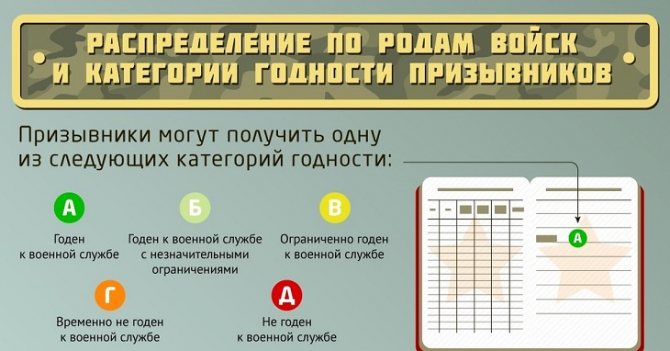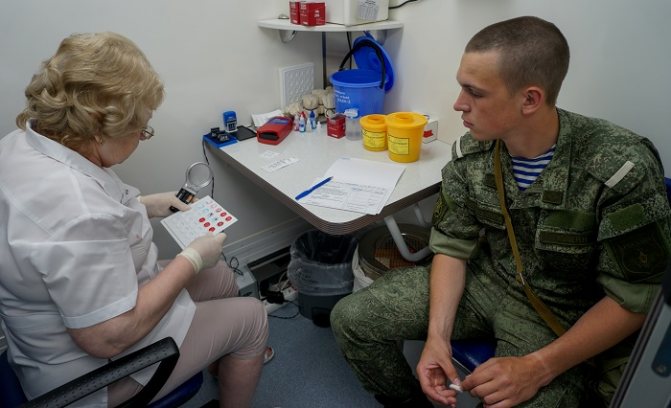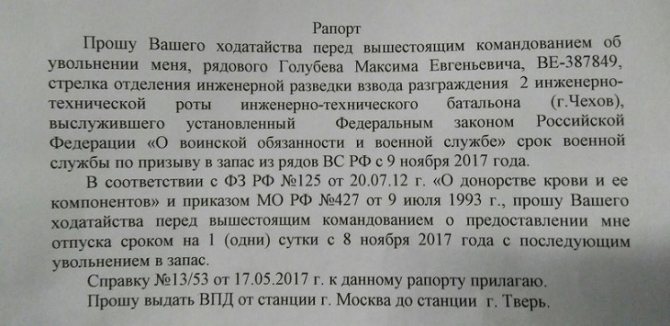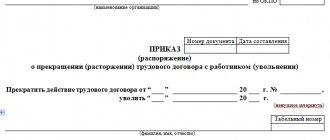Very high demands are placed on the health status of certain categories of citizens. Sometimes, if the condition worsens, it may be impossible to continue to perform your duties. A clear example is military personnel whose health condition may negate further service. If the physical indicators have deteriorated very much, then there is nothing else left but to discharge the military man for health reasons.
The procedure for dismissing a military personnel for health reasons
Free legal consultation
There are many differences between the work duties of military personnel and ordinary citizens. This also applies to those moments when a citizen needs to stop working.
An ordinary employee can resign at any time; all that is required is his desire. With military personnel, the situation is much more complicated, since leaving the armed forces is possible only for certain reasons. They are recorded in Article 51 of Federal Law No. 53.
Among others, it is not difficult to find dismissal based on the results of a military medical commission, which declares a citizen unfit for service. According to Presidential Decree No. 1237, it follows that only persons without significant deviations in health are suitable for military service. Therefore, five categories of suitability can be distinguished, and only two allow one to serve in the army. According to another decree, medical examination should occur in the following cases:
- When a citizen only intends to begin service under a contract or conscription.
- Upon admission to a military educational institution.
- Before military training begins.
- If, while serving, a serviceman is injured or experiences an exacerbation of some chronic disease.
- During service, medical examinations occur at regular intervals as planned.

After the examination has been completed, the citizen must have a certificate in his hands indicating whether he can continue to serve or whether he must be dismissed. It depends on the fitness category:
- A - it is possible to serve without restrictions.
- B - the service is not prohibited, but there are some restrictions.
- B - limited use.
- G - unsuitable for some period.
- D - complete disrepair.
If a serviceman does not have the appropriate conclusion of the commission, then it is impossible to resign due to deteriorating health.
Dismissal is always preceded by a full examination, which results in a conclusion about the presence of the disease and its severity. A medical commission carefully studies all data and results to determine the possibility of service. Then a conclusion is given, indicating one of the following reasons:
- General disease.
- A disease resulting from radiation exposure.
- Military injury (condition - the citizen received it during the performance of official duties).
Read also: How to fill out a notification of arrival of a foreign citizen in 2021
Then comes the writing of a report for the above reason and its transfer to the immediate command with the attached conclusion of the military medical commission.
Rights of military personnel
Citizens related to military service have the following rights:
- The state is engaged in the protection of military personnel; legal acts have been developed specifically for them, in which all rights are explained in detail.
- According to the Constitution, no one has the right to restrict the rights and freedoms of military personnel. The same applies to their service, here orders are given only by persons who have special authority to do so.
- The legal and social protection of the military is guaranteed by the state; it must also protect their life and health, as well as create conditions for normal life and service.
- The command bears direct responsibility for failure to fulfill the above obligations to military personnel.
- Military personnel and citizens studying under a military training program cannot be involved in combat missions.
- Women military personnel and single military fathers have the right to additional social guarantees and compensation.
- Military personnel can carry weapons with them, as well as use them in case of urgent need. This applies to periods when they are on duty, but sometimes also during off-duty periods. All aspects relating to the storage and use of weapons are reflected in the Charter.

How to submit the paper correctly and in what form?
A report is an oral or written report about something. The dismissal report is drawn up in writing.
In cases where a person is declared unfit for military service and is diagnosed with a disability based on the results of the military examination, it is not necessary to draw up a report. This basis does not allow further military service, even if the citizen wishes.
Expert opinion
Grigoriev Pavel Kirillovich
Head of the department for conscription of citizens for military service of the Russian Federation
Also, conscripts who have been declared limitedly fit cannot continue to serve (subclauses “c” and “d” of Art. 1).
51 FZ-53). They will be fired without a report.
However, often the military themselves want to write a report, or they are asked to do so by the personnel.
Military contractors recognized as limitedly fit for service can draw up a report and resign on this basis at their own request - sub. "b" clause 3 of Art. 51 FZ-53 (what are the conditions and procedure for dismissal from the RF Armed Forces at your own request, read here).
All circumstances stated in the health report must be supported by documentation. When dismissing, it is important to adhere to the following procedure:
- The serviceman submits a resignation report, which expresses a request to terminate the relationship and necessarily indicates the reason that does not allow him to continue serving.
- The certification commission reviews the report, after which its members make their own decision, with which the unit commander agrees or disagrees; the commission has the right to order an additional or repeat health check.
- If the decision is positive, the command issues an appropriate order and prepares the necessary documents.
Proper completion of documentation guarantees early dismissal from service due to illness.
If a military man is declared partially fit for service, his desire to leave the service is voluntary. A person cannot be forced to leave the service.
The application does not have a clearly established form; it can be drawn up in any form, but it is important to strictly follow the recommendations on the content. The report should not be wordy or vague. The text must be presented briefly, without lyrical digressions.
If a person encounters difficulties when writing a report, you can use a sample that can be asked from the personnel service employees.
What diseases serve as grounds for termination of service?
There is a list of groups of diseases that make further service impossible:
- Blood diseases that tend to develop rapidly.
- Diseases of the heart and blood vessels (moderate and severe).
- Neoplasms of a malignant nature.
- Disturbances and changes occurring in muscles and bones (moderate and severe).
- Myopia from 12 diopters and other progressive eye diseases.
- Skin lesions that cannot be quickly treated.
- Mental illnesses and neurological disorders (especially epilepsy).
- A number of chronic diseases of the genitourinary, endocrine, respiratory and digestive systems.
- Severe consequences of injuries, surgical interventions to correct bone defects.
- Tuberculosis, AIDS, sexually transmitted diseases.
Most often, the decision of the medical commission depends on the severity of the disease; in the initial stages, the category is “G” - temporarily unfit or “B” - fit with restrictions.

Medical contraindications to military service
Expert opinion
Grigoriev Pavel Kirillovich
Head of the department for conscription of citizens for military service of the Russian Federation
If, during a medical examination, the commission reveals any serious and dangerous disease that may become an obstacle to military service, the citizen may be dismissed.
According to current legislation, military personnel are subject to early dismissal from the RF Armed Forces if they have diseases included in the list of ailments for which they are considered unfit for subsequent service. To identify diseases and determine the state of health, the subject is required to undergo an appropriate examination and, based on its results, submit a report on dismissal.
It is worth noting that when determining the suitability of continuing military service, not only the nature and degree of the disease is taken into account, but also the branch of the military where the person is serving. If the subject has decided to leave his position earlier than the deadline established in the contract, then he should first familiarize himself with the list of ailments for which the military medical commission recognizes him as unfit to continue serving.
A more detailed list of pathologies for which a citizen may be deprived of his position is given in the relevant Regulations on military medical examination.
All diseases can be divided into the following main blocks:
- severe infectious diseases or illnesses caused by the presence of parasites. These usually include human immunodeficiency virus, tuberculosis, syphilis, mycoses;
- all kinds of malignant neoplasms, regardless of the organ and the degree of its damage. Especially if the disease has severely affected the body. If tumors of the brain and spinal cord are detected, the subject is subject to dismissal regardless of the quality of the tumor;
- serious diseases of the blood and hematopoietic organs. In this case, the pathology must certainly have a persistent progressive nature;
- significant disruption of metabolic processes and the functioning of the endocrine system with moderate or significant disruption of the functionality of the entire human body;
- mental disorders of a pronounced nature, as well as varying degrees of schizophrenia;
- pathologies of the human nervous system. This should include inflammation of the central nervous system, epilepsy, systemic atrophy, vascular diseases of the brain;
- diseases of the visual organs with a characteristic impairment of functionality, which arose as a result of serious injuries and burns. The following pathologies should be added to the list: retinal detachment, which is not associated with injury, as well as various color vision anomalies;
- diseases of the ear and mastoid process, persistent vestibular disorders;
- ailments of the circulatory system: heart failure, ischemic disease of the heart muscle with moderate severity;
- damage to the larynx and cervical spine with characteristic respiratory dysfunction, severe asthma;
- pathologies of the digestive system, in particular the esophagus and intestines. Persons with stomach ulcers also cannot serve in the Armed Forces;
- all kinds of skin pathologies that are difficult to treat. This usually includes eczema, psoriasis;
- ailments associated with the functioning of the musculoskeletal system;
- diseases of the genitourinary system;
- consequences of injuries that are severe and entail a serious disorder of the functions of the entire body.
How to write a report
Writing a report is the final stage of dismissal for health reasons. If a citizen has been diagnosed with a disease and has the commission’s conclusion in hand, this is enough for a report to be generated. If there is no such conclusion, you cannot write a report based on health conditions. It must include the following information:
- Information about the recipient, in this case the commander of the service unit.
- Information about the person submitting the report, rank and position held, the unit in which he serves.
- Reasons for submitting a report: specifically here - the state of health in the presence of a confirmed diagnosis and conclusion. Documents confirming the presence of the disease must be listed.
- Finally, the signature of the person submitting the report and the date of its submission.
Read also: How to find out the funded part of your pension through State Services?
Step-by-step recommendations for dismissal
Several chapters and articles in Presidential Decree No. 1237 are devoted to the procedure for dismissal from military service. They can be divided into those regulating the procedure for ending the contract and general provisions for termination of service.
In general, the dismissal procedure is standardized and varies depending on who initiated it.
The scheme for leaving service at the request of a serviceman is as follows:
- The occurrence of the reason for dismissal.
- Collection of documents confirming the existence of a basis.
- Submitting a report to the commander.
- Conversation with the boss.
- Waiting for the decision of the certification commission.
- Receiving a notice of refusal or order of dismissal.
- Final payment and exclusion from personnel.
We suggest you read: Salary upon dismissal: when should the payment be paid and how is the money calculated?
A person liable for military service who wishes to terminate his service must justify his decision. To do this, it is necessary to collect documents that confirm his right to dismissal, and indicate the reason in the report.
When submitting a report, the main thing will not be its presence, as in the civil procedure, but the specified reason.
The document is submitted to the commander or personnel department.
There are cases when the authorities refuse to accept a report on the dismissal of a serviceman at his own request, he disappears or is not hired.
In this case, military lawyers recommend sending the document by registered mail with an inventory and notification addressed to the commander. The procedure for receiving correspondence will become legal confirmation that the report was sent, and can become evidence in court if the case comes to trial.
The basis for removal from service affects its details and makes adjustments to the scheme. Thus, it is impossible to resign for health reasons without a conclusion from the Military Military Commission, and when submitting a report, the command is obliged to send the serviceman for examination. Family circumstances that arise, for example, the need to care for a sick spouse, will have to be documented.
https://www.youtube.com/watch?v=upload
The meeting of a commission designed to check whether the reason for dismissal is justified is initiated by the commander. The standard time for making a decision is a week. If additional information is needed for the commission's work, the proceedings may be delayed.
If a military man considers the commission’s refusal to dismiss to be unlawful, the law gives him a month to challenge the decision (Article 26, paragraph 10, UP 1237).
By this moment, he must be paid off for all obligations of the Moscow Region. The exception is the provision of housing to those in need, which can be postponed and implemented after dismissal.
Scheme of dismissal initiated by the commander:
- Make sure there are no legal conditions where the removal of a fighter is prohibited.
- Inform the soldier about the upcoming dismissal (during the process, a sheet of conversation with the serviceman is drawn up, the page is subsequently attached to the order).
- Assemble the certification commission and submit a list of documents proving the existence of grounds for dismissal.
- Issue an order for dismissal.
- Submit documents to the military personnel service.
- Notify subordinates responsible for the calculation of the military (for payments and obligations of the Ministry of Defense).
- Exclusion from the list of some military personnel and personnel.
If the decision is made by management, a report on dismissal from a serviceman is not mandatory.
Some of the grounds require preliminary documentary evidence:
- it is possible to initiate the dismissal of a soldier when doctors prohibit continued service only if there is a conclusion from the Military Military Commission;
- when the reason is a transfer to a departmental or government position, documents confirming the appointment are required;
- violations of the contract must be reflected in the personnel file.
When transferring documents to the personnel service of a military unit, the following are attached to the order:
- a sheet of conversation with a serviceman;
- conclusion of the certification commission;
- other documentary evidence of the reason for dismissal, for example, the conclusion of the IHC;
- military report, if available.
Under some circumstances, the commander is obliged, six months before the upcoming dismissal, to find out about the serviceman’s intentions regarding further service, and tell him about possible options for serving it: these include reaching the age limit and ending the contract. In addition, it is possible for military personnel being transferred to the reserve to undergo retraining.
After dismissal, all documents relating to the serviceman are sent to the military commissariat at the place of residence, where they are registered, and put into the archive.
There are a number of legal conditions under which it is impossible to dismiss a military man without his consent.
How does a military personnel undergo a medical examination?
Medical examination of military personnel is an establishment of which fitness category a particular person belongs to. Such an event is carried out by doctors, which always include a neurologist, ophthalmologist, surgeon, therapist, ENT specialist, and if necessary, additional examinations are prescribed.
Before specialists are scheduled, they must undergo fluorography of the chest cavity, urine and blood tests, and from 40 years of age - an ECG, glucose measurement, intraocular pressure. The frequency with which inspections will be carried out is decided by the unit commander.
If the commission determines temporary unfitness, then a decision is made to grant the citizen leave due to an illness or exemption from service. Leave is due when the incapacity for work lasts at least 1 month - this is in peacetime. Release is granted up to a month. If something like this happens in wartime, then the serviceman is sent to a convalescent battalion (with a period of incapacity of up to 3 months). For a period of more than 3 months in wartime, a temporary disqualification is issued and a re-inspection is scheduled after 6-12 months.
Vacation can be 30-60 days in peacetime. In any case, after treatment, a re-examination is carried out and a new conclusion is issued, necessarily with the establishment of fitness for service.
If a serviceman is injured while performing a combat mission, then, regardless of the duration of treatment, an examination is carried out only after that.

Procedure for termination of service due to deterioration of health
Military affairs, as a specific type of activity, leaves its mark on the process of formalizing termination of service. The list of stages that includes dismissal from military service is as follows:
- Undergoing treatment and subsequent medical examination;
- Obtaining a conclusion from a medical commission based on the examination and medical history;
- Drawing up a special protocol in case of impossibility of further service;
- Drawing up and submitting a dismissal report to the commander;
- The commander holding a personal meeting with the serviceman;
- Issuance of an administrative document on termination of service.
A serviceman leaves the armed forces only on his own initiative. Exempting him from military duty on the initiative of the command during a period of illness is unacceptable.
How is the medical examination of a military personnel carried out?
After undergoing medical examination, or receiving an injury or serious illness, the serviceman is sent for a medical examination. During the work of the medical commission, the following are examined:
- The general condition of the patient and his examination is carried out in accordance with the available indications;
- Documents about prescribed treatment, previous diagnoses;
- Lab tests;
- State of mind.
A decision to limit the possibility of serving is made only if the disease cannot be cured even after a long course of medical procedures. Based on the results of the examination, the commission issues a written medical report to which all the results of the research are attached.
How is a dismissal report prepared?
The legislation does not establish a clear form for the report on leaving service. It is drawn up in free form, but must contain a certain list of information:
- Rank, full name of the commander to whom it was sent;
- Document's name;
- Military personnel identification data;
- Circumstances serving as the reason for termination of service;
- List of supporting documents;
- Indication of legal norms permitting dismissal;
- Request to transfer the case to the military registration and enlistment office at the place of future residence;
- Information about the availability of housing and, if necessary, a request for a military mortgage;
- Date of compilation and signature of the person who wrote it.
A retiring serviceman, if he has served for 10 years or more, is required to provide housing in the region of his choice. In addition, he has the right to use a personal savings account in accordance with the regulations on military mortgages.
How is a personal conversation between a commander and a soldier conducted?
If the commander considers it possible to satisfy the desire of a subordinate, he is obliged to invite him for a personal conversation. The questions discussed during the meeting and the answers to them should be recorded in a special form. Representatives of legal, human resources, and accounting departments may be present during the communication. The form of the conversation questionnaire indicates:
- Reason for termination of service;
- Number of years of service;
- Diagnosis and conclusion given by the medical board;
- The fact of the presence or absence of housing;
- Requests from a soldier.
All persons present during the discussion must sign the completed form. After this, the commander issues a notice for dismissal, to which is attached a sheet of conversation and a conclusion. If the person conducting the interview has the right to issue a dismissal order, he draws it up; if a higher commander has such authority, the papers are sent to him.
How a personal conversation between a commander and a serviceman is conducted
Before leaving for health reasons, the serviceman will have a conversation with the unit commander. All of it should be reflected on paper, which is then placed in a personal file. The procedure, which is essentially a simple formality, is needed to clarify the dismissal process and prevent violations of the rights of a serviceman.
If any legal proceedings subsequently arise, this document will serve as evidence of the citizen’s true intentions. During the conversation, clarifications are made on the following issues:
- The attitude of the citizen himself towards dismissal, whether the option of further service is possible.
- Grounds for dismissal.
- The issue of length of service is being clarified.
- Was the military family provided with housing that complies with current standards?
- Where will the citizen live next, which military registration and enlistment office will he be assigned to, and where should his personal file be sent.
- Were vacations provided correctly (main and additional), was there retraining, and provision of allowances?
Read also: How to get a divorce through the registry office?
If there are some objections during the interview process, this should all be recorded on the conversation sheet. Sometimes such an event is held more than once. The conversation sheet must be signed by the military officer and the official himself. If there are no objections or disagreements, then the serviceman agrees with the dismissal.

Key Aspects
Any citizen in good health can become a professional military man. However, harsh conditions, exposure to harmful environmental factors, and constant physical activity have a destructive effect on the strongest organism.
Depending on the reason, termination of army activities is possible on the following grounds:
- unconditional dismissal (reaching the age limit);
- resignation;
- going to reserve;
- by court decision (conviction).
All officers and soldiers serving under contract have the right to leave the army at any time voluntarily or due to deteriorating health.
The problem of retirement (retirement) or transfer arises only with the development of an acute chronic disease. The main criterion for retirement is suitability for military service at any stage. Various health conditions can cause early termination of a contract.
Dismissal from military service for health reasons with payment of compensation has a number of features.
This is important to know: Free consultation with a military lawyer
Payments to a military personnel upon dismissal
The payments due to a serviceman upon dismissal depend on the length of service and the availability of a personal contribution award. Upon dismissal for health reasons, a serviceman is entitled to the following payments:
- A one-time benefit, its size depends on the rank and salary that the citizen received in the service.
- Financial assistance for rehabilitation.
- Additional compensation is provided in cases where a serviceman has suffered health damage while performing his immediate duties while on duty. Of course, this fact must be recorded by the commission.
- If, based on the results of the examination, a disability is diagnosed and, as a result, complete unfitness, then all payments due are further increased by an increasing factor.
- Insurance compensation is due when unintentional harm to health was caused during service. They are paid by the insurance company that concluded the insurance contract when signing the contract or upon conscription.
In addition, those dismissed for health reasons receive free travel, vouchers to a sanatorium, preferential housing, lifelong prevention and rehabilitation, and a 60% discount on housing and communal services.
What other guarantees are there for those discharged from military service?
There are also the following additional guarantees:
- Time spent in military service is always included in the total continuous length of service.
- Dismissed military personnel should be given priority work by public service bodies, of course, in accordance with their specialty.
- If there is a layoff in the organization where a former serviceman gets a job, then he retains the advantage of retaining his position.
- The children of a serviceman who has completed his service due to deteriorating health are given priority places in kindergartens, summer camps and sanatoriums.






